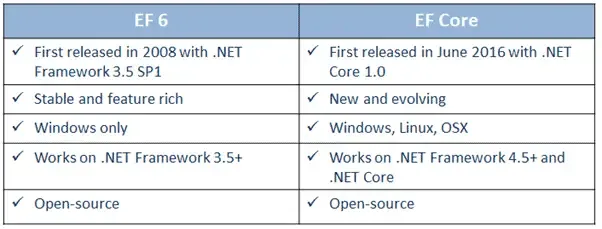Entity Framework (EF) and Entity Framework Core (EF Core) are both ORM (Object-Relational Mapping) frameworks developed by Microsoft, but they have some differences in terms of features, compatibility, and performance. Here's a comparison between Entity Framework and Entity Framework Core:
Entity Framework (EF):
Compatibility: Entity Framework (EF) is tightly integrated with the .NET Framework and is primarily targeted at applications built on top of the full .NET Framework (e.g., ASP.NET MVC, WPF, WinForms). It supports a wide range of features and database providers, including SQL Server, MySQL, PostgreSQL, Oracle, etc.
Features: EF provides advanced features such as lazy loading, automatic change tracking, database-first and model-first development approaches, EDMX file support, and more. It has been around longer than EF Core and has a more mature ecosystem with extensive tooling support.
Performance: EF is known to have performance limitations, especially in scenarios involving complex queries, large datasets, or high concurrency. It relies heavily on reflection and generates inefficient SQL queries in some cases.
Development Status: EF is considered feature-complete, and Microsoft has shifted its focus to maintaining and improving EF Core. While EF continues to be supported, new features and enhancements are primarily introduced in EF Core.
Entity Framework Core (EF Core):
Cross-Platform: Entity Framework Core (EF Core) is a lightweight, cross-platform ORM framework that is designed to work on .NET Core and .NET 5/6. It supports a subset of features compared to EF but is optimized for modern development scenarios and cloud-based applications.
Modularity: EF Core is designed with modularity in mind, allowing developers to choose only the features they need for their applications. It is lightweight and has a smaller footprint compared to EF, making it suitable for microservices and containerized applications.
Performance: EF Core has been redesigned for improved performance and scalability. It generates more efficient SQL queries, supports asynchronous database operations, and offers better support for modern database features like batch updates and database-specific optimizations.
Features: While EF Core lacks some of the features available in EF (e.g., lazy loading, EDMX file support), it introduces new features like Global Query Filters, Value Conversions, Owned Entity Types, and many-to-many relationships without an explicit join entity.
Tooling: EF Core integrates seamlessly with modern development tools and frameworks, including Visual Studio Code, Docker, and Azure Functions. It also supports reverse engineering from an existing database and migrations for managing database schema changes.
In summary, Entity Framework (EF) is a mature ORM framework with a rich feature set, primarily targeted at applications built on the full .NET Framework. Entity Framework Core (EF Core), on the other hand, is a lightweight, cross-platform ORM framework optimized for modern development scenarios and cloud-based applications. It offers improved performance, scalability, and modularity compared to EF, making it a preferred choice for new .NET Core and .NET 5/6 projects.





No comments:
Write comments